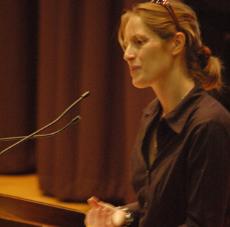As “Georgia on My Mind” played, photojournalist Linda Panetta showed a slideshow of protests filled with disturbing images to students and faculty at Nunemaker Hall .
Panetta, best known for her work in poor and war-torn countries and her dedication to the School of Americas Watch, was asked to speak last Monday about her role in the independent organization dedicated to the monitoring and closing of the Western Hemisphere Institute for Security Cooperation, formerly known as the School of Americas.
The WHINSEC is a U.S. military reservation, located in Fort Benning, Ga., that trains foreign soldiers in matters of warfare.
The images displayed by Panetta were taken at an annual protest outside the institute. Black-clad protestors with their faces painted white carried crosses bearing the names of WHINSEC graduates’ victims and signs with slogans like, “Ain’t Gonna Study War No More” and “Terrorists ‘R U.S.” Other pictures showed protestors being arrested for crossing onto Fort Benning property, while others displayed images of children and tearful mothers.
“I’m at a Catholic school so I can say this,” laughed Panetta, scanning the audience before becoming more serious. “God calls us to care for our brothers and sisters in need.”
The 28 Jesuit universities across the country have responded to this call to brotherhood by forming the Ignatian Solidarity Network, which attends the annual WHINSEC protest in hopes of stopping the violence.
“Loyola has participated in the protests, along with the other Jesuit universities, for several years,” said sociology senior Kathleen Fanone, chairwoman for Students of Solidarity, a LUCAP committee.
“We usually celebrate mass together and have speakers while we are in Fort Benning. The first year I went, I had never seen anything like it. It was more than a protest – it was a time for healing for so many people. I went not knowing anything and came back wanting to get involved.”
The WHINSEC has been a source of debate for years, as subjects are taught military intelligence, interrogation tactics, sniper tactics and psychological warfare. The institution was founded in 1946 in Panama, but has been located in Fort Benning, Ga., since 1984 after the president of Panama forced it to leave, citing the institution as the nation’s “biggest destabilization factor.” The institution was renamed in 2001.
Graduates of the institution include top leaders under Augusto Pinochet, Chile’s president from 1973-1981, soldiers responsible for violent coups throughout Latin America and the worst human rights violators south of the border, said Panetta during the lecture. These soldiers are also U.S. supported and responsible for thousands of rapes, tortures, pillages and deaths in Central and South America, she said.
After the slideshow, Panetta turned her attention from the WHINSEC to post-Katrina New Orleans and the wars in Iraq and Afghanistan. She also expressed her disfavor for President George W. Bush’s policies, saying that, “Bush is incompetent at home and abroad.”
“We (LUCAP) were concerned that she didn’t effectively communicate the issues surrounding SOA and wondered if people left with more questions than answers,” said Fanone. “Linda Panetta is passionate and inspiring, but we wish she had focused more on the SOA. Also, LUCAP is a non-partisan group – we don’t promote government or military bashing, we promote awareness.”
LUCAP is sponsoring an informational meeting for students who want to know more about the institution or who want to get involved in the protest, which will be held Nov.17-19. Carlos Mauricio, a torture survivor, will also address protest attendees to prepare for the event. There are 56 available spaces, and will cost about $35, which includes transportation and lodging.
Kelly Roth can be reached at [email protected].







